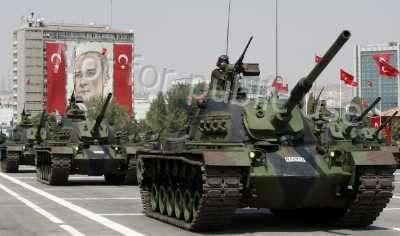Hüsnü Öndül, president of the Human Rights Association (IHD) during the time when the military was planning coups in 2003 and 2004, has said that he expected tension but not a coup at that time.
Commenting on the investigation into Ergenekon, a clandestine ultra-nationalist organisation with military support, aiming to overthrow the government, he spoke about the time when the plans were being made, in 2003 and 2004:
“I expected great tensions at that time, and in 2004 I even wrote articles in which I expressed my happiness over the fact that those tensions were not visible.”
Two diaries published alleging coup plans
Following the publication of the diaries of former navy commander Özden Örnek in the Nokta magazine in 2007, it became clear that the army commanders had made a coup plan, and when it failed to be realised, that former Gendarmerie commander Şener Eruygur, now a defendant in the Ergenekon trial, continued to make a plan of his own.
The publication on the Internet this week of diaries alleged to be written by journalist Mustafa Balbay, under arrest in the Ergenekon investigation, has shown that soldiers were frequently discussing the possibility of a coup.
EU negotiations on the agenda at the time
In those years, 2003 and 2004, Hüsnü Öndül was the president of the Human Rights foundation. He remembers that the main points on the political agenda at the time were the EU accession process, democratisation and several reform packages quickly passed by the government of the Justice and Development Party (AKP).
“I predicted tensions and obstructions in the EU process, foreseeing that those circles not wanting democracy, especially the army, would show great resistance. This means that there really was such tension, that we got off lightly.”
Öndül points out that the AKP was able to count on support of pro-democracy circles at the time, but that the government has taken steps backwards. “The changes in the Anti-Terrorism law, the amendments allowing the police more powers, and the surveillance of the whole of society. We are all in custody and the PM say that he supports that.”
Öndül doubts AKP's commitment
The human rights activist is suspicious of the government’s claim of being supportive of the Ergenekon investigation. Rather, he believes that the AKP government has agreed on a compromise with the army, and that it is the army who is deciding how deep the Ergenekon investigation will dig.
"Two-headed" judiciary system
“There can be no counter-guerilla force without soldiers. We are talking about a special war office. In Turkey, no civilian prosecutor, no police officer, not even the Minister of the Interior, is allowed to enter a gendarmerie station without military permission. With today’s two-headed judiciary system (that is civilian and military courts), it is impossible to solve the counter-guerilla events.”
As an example, Öndül gives the Şemdinli court case, where two Gendarmerie officers were accused of bombing a bookshop. The case was handed over to a military court by the Supreme Court of Appeals.
Criticism of Ergenekon procedures
While Öndül finds the investigation into Ergenekon important, he criticises some of the procedures:
“Without any evidence, the prosecutor calls someone and asks, ‘What do you think about this?’ Information that was obtained through illegal bugging and details of people’s private lives are being leaked to the press. Thus we have a “parallel trial”. Government operations against other groups, for instance, Kurds, socialists, people with different sexual orientations, people with religious sensitivities, have always been carried out in such a way. If we accept this and watch in silence, then one day it will be our turn.”
“The prosecutor must prove that he obtained the evidence in a legal manner. We must demand the rule of law and a fair trial for everyone.” (TK/AG)
















